“I hesitated for just a moment. Some part of me wanted to see the creature, after having heard it for so many days. Was it the remnants of the scientist in me, trying to regroup, trying to apply logic when all that mattered was survival? If so, it was a very small part. I ran.” — Annihilation, Jeff VanderMeer
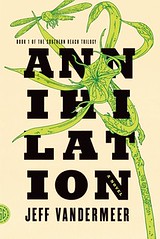 Annihilation
Annihilation
Jeff VanderMeer
![]()
I haven’t read Lovecraft, but halfway through Annihilation I began to think of it as Lovecraftian. Now I’ve finished the novel and glanced at some of the reader reviews, I see I’m not alone. The first thing I did upon finishing Annihilation was to download the second novel in VanderMeer’s trilogy, Authority. The second was to pre-order the third, Acceptance (set to release this September). The third thing I’m doing right now, reminding myself in writing to start reading Lovecraft!
I’ve always felt that if we ever encounter something truly alien we won’t be able to understand what we’re seeing; our minds will instinctively reject it and we might not even be able to force our eyes to look at it. Such is the case with whatever is growing inside Area X.
Other reviewers have offered summaries, so I’ll keep mine short. On the edge of a nation that seems a lot like ours … a modern Western nation only slightly removed from the present day … a coastal region has been enclosed by an incomprehensible (incomprehensible in that alien sense I alluded to above) border which repels people and keeps them from entering. This is Area X. A secretive government agency has figured out how to insert teams of investigators, hypnotizing them so that they can get through what normally would repel them, and has sent several expeditions into Area X. All have ended badly: some teams simply disappeared, never to return; some committed mass suicide; some turned on one another; some emerged as empty shells with no memories of what they encountered inside. Still, some information about Area X has accrued: it is known that the topography inside Area X is the same as it was three decades ago, before the border appeared; plant and animal life is abundant but no humans remain; there are some hand-drawn maps showing major features, including the ruins of a village and a lighthouse.
The narrator of the story is a biologist, a member of the 12th expedition, a four-woman team whose other members include a psychologist, a surveyor, and an anthropologist. Once they emerge from hypnosis inside Area X, they find what they expected to find: hills and forests, the previous expedition’s base camp, the ruins of the village, marshes and reeds with brackish canals; in the distance dunes, the coast, the lighthouse. Then they begin to find the unexpected, things that aren’t on the map, and an unseeable alienness becomes apparent. In less than a day only three members remain; a day later just two; by the third day only the biologist remains. That is all I will say about the story itself.
Wow, what a setup. The biologist is aware that whatever is growing inside Area X is changing her own body at the cellular level. She is frightened but her curiosity is stronger; despite her growing sense of dread she digs deeper and deeper, finally encountering the truly alien. She cannot comprehend what it is she’s not quite able to see, and VanderMeer conveys this in a masterful way … I shared the biologist’s sense of dread, which grew stronger page by page, as did my own curiosity. I wanted to encounter the alienness inside Area X; when the biologist and I did, I too could not comprehend it. And I sensed that larger alien forces are at work there too, slowly combining with, or incorporating, the human members of expeditions sent into Area X.
The writing perfectly matches the mysterious, threatening environment of Area X. Humans are an intrusion; we don’t know their names, just their functions … yet we learn a great deal about the biologist’s very human personality and past, and want to learn more about what she’s becoming.
Oh, I am so ready to read the second two books of this trilogy!
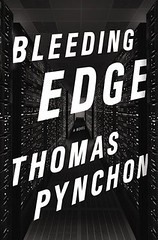 Bleeding Edge
Bleeding Edge
Thomas Pynchon
![]()
I waited a couple of days before attempting to review this novel. The longer I waited, the more trivial Bleeding Edge seemed … trivial in the sense of lacking meaning or import … but that didn’t mean I didn’t enjoy reading it. I read the early Pynchon novels (The Crying of Lot 49, V, Gravity’s Rainbow) in the 60s and 70s, when he was writing the new literature of a new generation, the David Foster Wallace of the day. A few years ago I picked up Mason and Dixon and couldn’t get past the first two chapters … my tastes had changed, and I now found Pynchon too contrived, artificially playful and dense … a showoff, in other words … and didn’t come back to Pynchon until Bleeding Edge.
Gee, Thomas Pyncheon is well into his 70s now, pushing 80, but Bleeding Edge took me straight back to the Pynchon of the 60s and 70s, and apparently my tastes have flipped once again, because this time I didn’t mind his showing off so much.
One reason I liked Bleeding Edge is that I initially found the central character, Maxine, relatable. She seemed real at first. Another is that I felt Pynchon captures the state of the dot com industry as it was circa 2000-2001. His description of New York City’s Silicon Alley culture at the turn of the century feels right and jibes with my own memories (except for all that “deep web” nonsense, but that fits in with other paranoid conspiracy themes Pynchon explores in this novel — Montauk, the 9/11 truther stuff, the Mossad and the CIA, Gibsonesque hints at the possibility of a virtual life separate from the physical one).
As I read on, however, Maxine became less relatable and less genuine, more of a foil for Pynchon’s verbal playfulness, always ready with a quip or a pun, always present at key plot points, critical bits of secret intelligence coming her way as if by magic whenever the story needs to be nudged along. She’s a plot device. The paranoid conspiracy stuff, which Pynchon injects into the story in turkey baster sized doses, is never resolved. And overall, apart from the 9/11 terror attacks, nothing really happens. There’s no closure, no tying up of loose ends, life goes on. The story opens a window into a specific time and place, immersing you into Pynchon’s infinite mental storehouse of pop cultural references and love of words and wordplay … and then someone draws the shades and the story is over.
Bleeding Edge is an exercise in writerly virtuosity and playfulness, great fun to read if you’re in the right mood, but ultimately unsatisfying. I feel like I just ate a bag of the best Cheetos I’ve ever tasted, a special vintage batch prepared for a very select clientele. I wolfed them down, but they were empty calories. I’m still hungry and now I feel vaguely guilty.
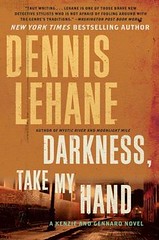 Darkness, Take My Hand
Darkness, Take My Hand
Dennis Lehane
![]()
This was a monthly book club selection. We wanted to read something in the hard-boiled detective/noir fiction genre, and several reviews applied those labels to this novel.
One of the characteristics of noir fiction is a flawed protagonist. Patrick Kenzie is certainly that, so, yeah, noir. Now I don’t know where this is written down, but to me a central characteristic of hard-boiled detective fiction is the dispassionate, literal presentation of facts: “She reached for her gun. I shot her. ‘You bastard,’ she said, as she crumpled to the floor.” That sort of thing.
Hard-boiled detectives don’t lose sleep wondering why the bad guys they’re after are so bad. Badness is a given. Hard-boiled detectives don’t moon over broads and puppy dogs. Hard-boiled detectives don’t share pillow talk or tell you about the sex they’re having with their girlfriends. Patrick Kenzie must have Mike Hammer spinning in his grave. Patrick Kenzie is a lightly poached egg, runny and dripping, not even remotely hard-boiled.
What Darkness, Take My Hand really is is a serial killer thriller, and, like every serial killer thriller I’ve read, it’s massively overwrought and strains credulity. How do back-alley Beantown numb-nuts dropouts turn into Moriarty-like criminal masterminds with almost supernatural powers? How did they get to be so goddamn smart? You don’t see that in real life, and that’s my biggest objection to this book.
Well written, yes. Good characterization, at least when it comes to Kenzie and Gennaro. Good Boston vibes throughout. Noir … but not hard-boiled. What Patrick Kenzie really needs is a good therapist.
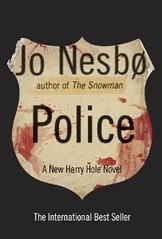 Police: a Harry Hole Novel
Police: a Harry Hole Novel
Jo Nesbø
![]()
Spoilers ahead, so don’t read if that sort of thing freaks you out.
This was my first Harry Hole novel, and in fact the first thing by Jo Nesbø I’ve read. I read a glowing review of Nesbø’s Harry Hole series somewhere, and from it learned the Norwegian movie Headhunters, which I had seen and thought brilliant, was either screenwritten by Nesbø or based on one of his novels. Well, I have to read this guy now, I thought.
Maybe I picked the wrong novel to start. This is the tenth Harry Hole novel, and I came into it cold. From the first pages it was apparent that in the previous novel legendary Oslo Detective Inspector Harry Hole had either been killed or put into a coma from which he was unlikely to recover. Since there was an unnamed man in a coma in a hospital room, it was most likely the latter. I wondered briefly why Nesbø was going out of his way to keep the coma victim’s name a mystery, but I pressed on.
Nesbø’s coyness with the coma victim’s identity should have set off warning bells. A few chapters later, when Nesbø suddenly revealed that Harry Hole was not only alive but teaching at the police academy, I actually put the book down for a second and spoke out loud to my dog. What I said to my dog was, “What a cheap trick.”
The novel is full of such tricks, one every few pages. Characters seem to be in imminent danger, but the murderer lurking in the shadows turns out to be an innocent colleague, holding not a gun but a cup of coffee. The dead body found concealed in a false ceiling turns out to be … a badger. The criminal mastermind Nesbø spends fully half the book building up turns out to be an irrelevant sideshow, dropped from the storyline after he serves his purpose. Suspect after suspect is set up as the cop killer, each one coming out of left field. Nesbø takes the reader to the brink again and again, only to spring yet another surprise and zag off in an unexpected direction.
Another reviewer said he thought this novel was manipulative and gimmicky, and I agree … in fact I found Nesbø’s tricks so very manipulative and gimmicky that I simply could not imagine any part of this story happening in real life. Toward the end I actually found myself flipping pages to get to the next surprise twist, knowing what I was reading at the moment would turn out to be yet another false tangent.
Overwrought, gimmicky, manipulative. That sums it up. Why two-and-a-half stars, then, and not two? Because the translation is excellent, I suppose. Because I did finish the novel, after all. I kept thinking that if Nesbø had only put his well-developed characters into a realistic plot, investigating the kinds of crimes that actually occur in real life, this would have been a damn good police procedural. Instead, he chose to show off.
Will I read more by Nesbø? Yes, but no more Harry Hole … this one just burnt me out. I’ll try one of the other novels instead.
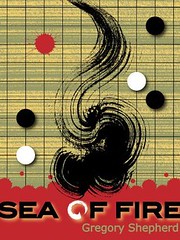 Sea of Fire
Sea of Fire
Gregory Shepherd
![]()
My fascination with North Korea is such that I will read virtually anything that purports to be about that forbidding country and its bizarre society. Sea of Fire is proof of that.
This novel is virtually unknown. There are no Goodreads reviews. Even though I read the Kindle edition, it’s no longer listed on Amazon. It never had a Library of Congress number. I can’t even remember how I learned of it.
First, the good, and the reason I gave it two stars: it’s digestible. Gregory Shepherd’s prose is solid and the edition I read was pretty much typo-free, something that cannot be said for many ebooks by well-known writers. As for the story, if you can ignore the ridiculousness of it, it’s a page-turner with plenty of suspenseful threads to be followed to the end.
The bad? I mentioned ridiculousness. The villains are transplants from an Austin Powers movie; the hero — an American Zen cowboy with a secret past as a CIA assassin — seemingly stepped out of a James Bond movie. The bad guys are comically evil; the good guy gets away with things that would be impossible even for a high-ranking North Korean, let alone a foreigner. There is almost nothing in Shepherd’s story that could happen in real life; it is contrived nonsense.
And sucker that I am for stories about North Korea, I read it. What is wrong with me?
Books I Didn’t Finish
 Cubed: A Secret History of the Workplace
Cubed: A Secret History of the Workplace
Nikil Saval
![]()
Another of my book club’s monthly selections, Cubed appears to be a well-written and witty look at the history of the modern white-collar workplace, the sort of thing Mary Roach might write. I found myself so antagonistic to the subject, however, I had to put it down. A few years back I burnt out in a managerial job I hated right down to the center of my soul. I couldn’t warm to Saval’s subject and abandoned the book after finishing only the introduction and first chapter.
To Nikil Saval I have only this to say: it isn’t you, it’s me.